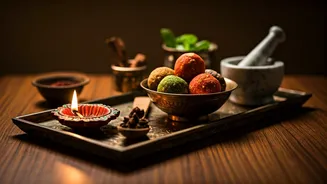Diwali & Ayurveda
Diwali, a vibrant festival, is an excellent opportunity to align celebrations with the principles of Ayurveda, an ancient Indian system of medicine. Diwali often
involves rich foods and late nights, which can disrupt the body's natural balance. Ayurveda offers a roadmap to navigate this festive period while prioritizing health. The focus is on promoting digestion, detoxification, and overall well-being. By incorporating Ayurvedic practices into your Diwali routine, you can enjoy the festivities while maintaining a healthy lifestyle. This approach allows you to savor the joy of Diwali without compromising your physical health, making the celebrations even more enriching.
Abhyang Snan's Significance
Central to Diwali celebrations in Maharashtra is the 'Abhyang Snan', a ritualistic oil bath performed on Narak Chaturdashi. This practice involves massaging the body with warm oil, often sesame oil, before bathing. The benefits are numerous, including improved circulation, detoxification, and a sense of relaxation. The Abhyang Snan is believed to cleanse the body and soul, preparing you for the festivities. This tradition, rooted in Ayurveda, promotes a connection between the mind and body. The massage helps to soothe the nervous system and promote sound sleep, while the bath rinses away impurities. Integrating this practice ensures that you embrace Diwali feeling refreshed and revitalized.
Healthy Food Choices
Ayurveda emphasizes the importance of making wise food choices during Diwali. The festival often involves indulging in sweets and fried foods, which, while delicious, can be heavy on the digestive system. A balanced Ayurvedic approach suggests incorporating lighter, more easily digestible foods to counteract this. Favoring homemade sweets made with natural sweeteners, opting for baked snacks over fried ones, and including plenty of fresh fruits and vegetables can help. Herbs and spices like ginger, turmeric, and cumin, known for their digestive properties, are invaluable. By consciously selecting foods that align with your body's needs, you can enjoy the Diwali feast without experiencing digestive discomfort, maintaining a sense of balance amidst the celebrations.
Herbal Tea Rituals
Adding herbal teas to your Diwali traditions offers a calming influence and promotes detoxification. Consuming specific herbal teas can aid digestion, reduce bloating, and boost immunity, which is crucial during a period of overindulgence. Ginger tea, for example, helps with digestion, while chamomile tea can soothe the nervous system. You could consider creating a special Diwali tea blend with ingredients like cardamom, cinnamon, and cloves for a festive aroma and added health benefits. Preparing and enjoying herbal teas is not just about the health benefits; it's also a mindful practice that encourages relaxation and reflection. This simple ritual can transform your Diwali experience, allowing you to be more present and enjoy the moment.
Rest & Relaxation
Diwali is a time of social gatherings and celebrations, but also an opportune time to focus on rest and rejuvenation. Ayurveda acknowledges that rest is as important as activity. Getting adequate sleep is essential for the body to repair itself and maintain balance. Make sure to schedule periods of rest throughout the busy festive period. Practice relaxation techniques like deep breathing or meditation to calm the mind and reduce stress. Creating a quiet space where you can retreat to recharge is crucial. This helps to balance the excitement of Diwali with a sense of inner peace. Prioritizing rest allows you to fully enjoy the festivities while keeping your energy levels high, promoting both physical and mental well-being during the Diwali season.
Mindful Gifting Practices
Giving gifts is a cherished Diwali custom, and you can incorporate Ayurvedic principles into this practice, promoting both health and well-being. Think about gifting items that support healthy lifestyles. Consider including herbal teas, aromatherapy diffusers, organic skincare products, or even a book on Ayurvedic practices. Such thoughtful gifts are a way to convey your love and care, and they provide health benefits to the receiver. Avoiding overly processed or sugary treats in favor of wholesome alternatives is another way to promote well-being. This approach not only enhances the festive atmosphere but also reflects a commitment to health and mindful living. Choosing gifts that contribute positively to the recipients' health aligns perfectly with the Ayurvedic ethos.












